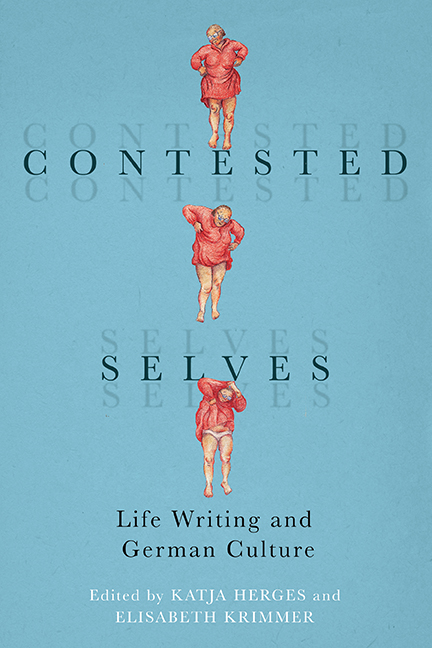Book contents
- Frontmatter
- Contents
- Acknowledgments
- Introduction
- Part I Women’s Life Writing, Female Subjectivity and Agency
- Part II Modern Life Writing and Aesthetics
- Part III Trauma and Vergangenheitsbewältigung
- Part IV Transnational and Transgenerational Life Writing in Contemporary Germany
- Bibliography
- Notes on the Contributors
- Index
10 - Lena Gorelik’s Autofictional Letter Lieber Mischa: A Guide to Being Jewish in Contemporary Germany
Published online by Cambridge University Press: 26 May 2022
- Frontmatter
- Contents
- Acknowledgments
- Introduction
- Part I Women’s Life Writing, Female Subjectivity and Agency
- Part II Modern Life Writing and Aesthetics
- Part III Trauma and Vergangenheitsbewältigung
- Part IV Transnational and Transgenerational Life Writing in Contemporary Germany
- Bibliography
- Notes on the Contributors
- Index
Summary
A QUICK SURVEY of the various biographical sketches of author Lena Gorelik available in English, Russian, and German shows that her works are centrally concerned with questions of self, identity, and positionality. To navigate the murky waters of contemporary Jewish identity in Germany, Gorelik relies on the dialogical dimensions of life writing. In Lieber Mischa (Dear Mischa)—an autofictional narrative in epistolary form first published in 2011—the author addresses a series of letters to her son, thus weaving together autobiographical, epistolary, and fictional components. Through the hybrid narrative mode of autofiction, the text grapples with central questions of Jewish heritage and identity in Germany.
In the following I first give a brief overview of the cultural and historical implications of being a Jewish writer in post-Shoah Germany. I argue that Jews in Germany are still faced with a unique situation: although the focus is shifting toward a transnational approach, the history of the Holocaust and the victim-perpetrator dichotomy still influence contemporary public discourse about Jewish life and writing in Germany. The second section discusses the function of genre in Lieber Mischa. Lena Gorelik uses the autobiographical aspect of autofiction not only to position herself and to find her own “truth” about her identity but also to make use of readers’ fascination with “authentic” portrayals of minority identities. By adding a fictional component, though, she creates a distance between herself and her literary doppelgänger—her alter ego—and refuses to “bare her soul” completely to satisfy the curiosity of her audience. Finally, I analyze the text's reflection of contemporary Jewish identity in Germany. Gorelik constructs her literary identity at the intersection of the transnational experience of migration, the German Jewish notion of Jewishness as a religion, and the Soviet Russian understanding of Jewishness as a “nationality.” Through her autofictional identity construction she seeks to inform her Jewish and non-Jewish German readers about contemporary Jewish life in Germany and to draw attention to German society's problematic interest in her “exotic” status as a Jew and an immigrant from Eastern Europe.
Germany as a Setting for Jewish Life
On the surface level, Gorelik's letters are seed packets designed to pass on Jewish heritage to the author's child and to the next generation of Jews in Germany.
- Type
- Chapter
- Information
- Contested SelvesLife Writing and German Culture, pp. 205 - 228Publisher: Boydell & BrewerPrint publication year: 2021



